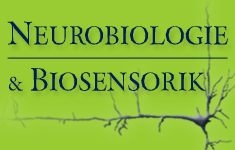 |
||
|
Jan Suchland
Research Project Subjective tinnitus is an auditory phantom sensation that is perceived without an external sound source. Tinnitus is usually induced by inner ear damage of various origins (e.g. age-related hearing loss, noise exposure, acoustic trauma, ototoxic drugs). Due to an altered acoustic input from the damaged inner ear, the plasticity of the central nervous system leads to functional and structural changes causing tinnitus. While the initial hearing loss caused by the inner ear damage can sometimes recover partly or fully or can be compensated for by a hearing aid, the induced tinnitus is usually irreversible and becomes chronic because the plastic changes in the brain persist. In my PhD project I will investigate the tinnitus related changes in different brain areas, like the inferior colliculus (IC) and the auditory cortex (AC) and compare the neuronal firing patterns of animals with and without chronic tinnitus. Parts of my PhD work: I) Comparison of the spontaneous activity in the IC and AC In the first part of my project I will examine tinnitus-induced changes on the level of single neurons and neuronal clusters by analyzing the spontaneous activity in the brain of anaesthetized Mongolian gerbils. Changes in this stimulus-independent activity are believed to be the source of chronic tinnitus. For these investigations the inferior colliculus, the principal midbrain nucleus of the ascending hearing pathway, and the auditory cortex are the most promising structures. II) Influence of neurotransmitters and neuromodulators in the IC and AC In the next part of my project the local influence of different neurotransmitters and their antagonists on tinnitus-dependent activity changes will be examined by using electro-microiontophoresis. In contrast to a systemic application this method allows a local application of the chemicals and therefore specific conclusions about the local sources of changes in spontaneous nerve activity. Additionally, the use of neuromodulators will allow to draw conclusions about the modulating influences of other brain areas (e.g. limbic system) on the inferior colliculus and the auditory cortex. Funding I am funded and supported by the Stiftung Polytechnische Gesellschaft Frankfurt am Main. |
FB15
Arbeitskreis Neurobiologie und Biosensorik
Institut für Zellbiologie und Neurowissenschaft
Biologicum, Campus Riedberg
Gebäudeteil A, 3. Stock
Max-von-Laue-Str. 13
60438 Frankfurt am Main
T +49 69 798-42050
E-Mail
- Studying at Goethe University
- International applicants
- Faculties
- Overview of study programmes
- Programme for refugees
- GRADE
- Goethe Business School (continuing education)
- Research at Goethe University
- Scientific news
- Goethe Welcome Center (for international researchers)
- Collaborative research projects
- Individual research
- Visiting fellowships
- Endowed chairs
- About the University
- News-in-brief
- University administration
- Campus locations
- Campus life
- University archives (German)
- Rhine-Main-Universities






